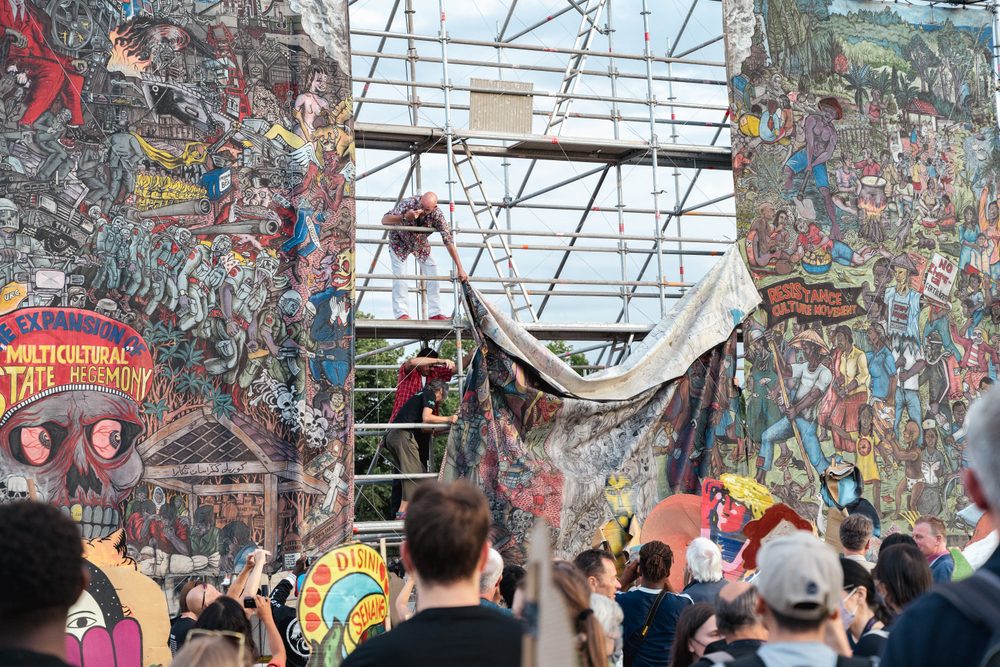
As previously reported by The European Conservative, the political pressure on the organizers of documenta 15 has been rising for weeks following the inclusion of a mural with antisemitic elements in the exhibition. Despite public apologies by the responsible Indonesian artist collectives, it was inevitable that someone would take the fall. This has now happened. The general manager of documenta, Sabine Schormann, has agreed to terminate her contract with the supervisory board and the shareholders. She will be replaced by a hitherto unannounced interim successor. On July 16th, the supervisory board released a statement announcing Schormann’s resignation and giving insight into the future intended for documenta.
The supervisory board expressed its “deep consternation that clearly antisemitic motifs were to be seen on the opening weekend of documenta 15.” The board considers it “essential to clear up this incident promptly, to draw conclusions based on scientific findings for dealing with antisemitic incidents in the cultural and art context, and to avert further damage to documenta.” Furthermore, a “great deal of trust has been lost,” so that the board considers it “essential that everything possible has to be done to regain this trust.” Apparently, the resignation of the director was part of this effort.
It remains doubtful, however, whether this will be enough to calm the waves of outrage in Germany and abroad. Remko Leemhuis, director of the American Jewish Committee Berlin Lawrence, considers it “outrageous” that the statement of the supervisory board isn’t “expressing one word of regret or issuing an apology to the Central Council of Jews in Germany or the Jewish community in Germany as a whole about the damage this has caused.” Leemhuis told CNN that the inclusion of the antisemitic Indonesian artwork, “People’s Justice,” in the exhibitions has shown that there is a “massive problem” with antisemitism in German art and culture.
The supervisory board hopes to combat these issues in an academic manner, as “a process of consultation with scholars from the fields of contemporary antisemitism, German and global contexts, postcolonial studies and the arts.” After taking stock of existing procedures and structures, these experts will “recommend ways of drawing lessons and identify the issues at stake in need of further academic research.” These consultants will also “advise in case further antisemitic imagery should come up.”
The antisemitic imagery on display in the work “People’s Justice” isn’t, however, the only part of the latest documenta edition spiraling out of control.
The exhibition space of a Palestinian artist group taking part in documenta was attacked and vandalized, probably in retaliation for the anti-Semetic artwork. There were numerous complaints by staff members for being seriously overworked. Last but not least, disputes erupted over the threat posed by heteronormative, white men, who were also in attendance at documenta. “BDSM-friendly music events,” organized by the Delhi collective party office, openly privileged “non-white, queer, and neurodivergent people,” going as far as rejecting white men at the entrance. This rejection, in turn, was met with “verbal and gestural aggression from White men asked to leave our space,” said curator Shaunak Mahbubani. Artist Joey Cannizzaro went even as far to accuse documenta of doing “absolutely nothing to keep us safe.” He referred to Kassel, where documenta is taking place, as a “neo-Nazi city” in which hundreds of artists “don’t feel safe enough.”
None of these issues, however, have made major headlines, so the remaining organizers from the Global South may be hopeful that the resignation of the director over the antisemitism scandal may calm the waters.